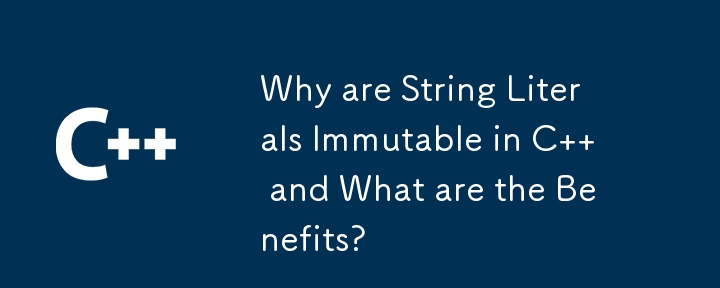Home >Backend Development >C++ >Why are String Literals Immutable in C and What are the Benefits?
Why are String Literals Immutable in C and What are the Benefits?
- Patricia ArquetteOriginal
- 2024-10-27 14:59:02555browse

Immutability of String Literals: Why and How It Benefits
String literals in C are notoriously immutable, meaning they cannot be modified once declared. This poses questions about the reasons behind such a design choice, along with its implications.
Reasons for Immutability
There are multiple reasons for the immutable nature of string literals:
- Read-Only Memory (ROM) Optimization: String literals are typically stored in ROM, where the data remains intact throughout program execution. Making them immutable ensures the integrity of data stored in ROM.
- String Literal Merging: The compiler can merge identical or partially overlapping string literals, optimizing memory usage by pointing multiple pointers to the same memory block. Modifying a string literal would disrupt this optimization.
Implications of Immutability
- Undefined Behavior: Attempting to modify a string literal leads to undefined behavior, as it violates the assumption of immutability. This safeguard prevents unpredictable consequences.
- Compilation Speed Optimization: The immutability of string literals allows for faster compilation, as the compiler doesn't need to perform bounds checking or other checks for potential modifications.
- Memory Optimization: As mentioned earlier, string literal merging can save valuable memory, especially when dealing with large strings or multiple occurrences of the same string.
Compiler Behavior
The standard allows for various compiler optimizations involving string literals:
- Read-Only Storage: Compilers may store string literals in read-only sections of the executable file.
- Literal Pooling: Compilers may merge identical string literals into a single copy stored in a literal pool.
- String Fragmentation: Compilers may even split long string literals into fragments to optimize memory usage.
In conclusion, the immutability of string literals in C serves multiple purposes, including optimization for ROM storage, string literal merging, ensuring predictable behavior, and reducing compilation and memory overhead. By understanding these reasons and implications, developers can effectively leverage string literals in their C programs.
The above is the detailed content of Why are String Literals Immutable in C and What are the Benefits?. For more information, please follow other related articles on the PHP Chinese website!
Related articles
See more- C++ compilation error: A header file is referenced multiple times, how to solve it?
- C++ compilation error: wrong function parameters, how to fix it?
- C++ error: The constructor must be declared in the public area, how to deal with it?
- Process management and thread synchronization in C++
- How to deal with data splitting problems in C++ development

